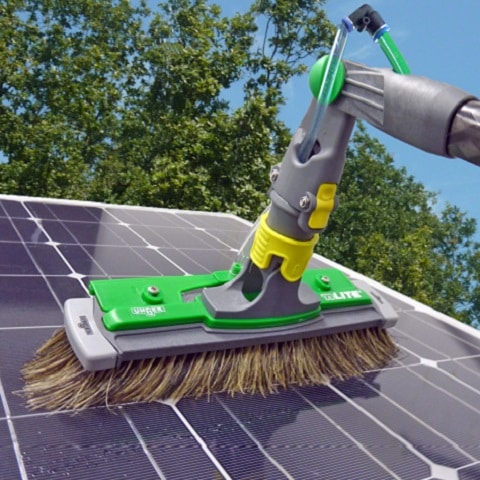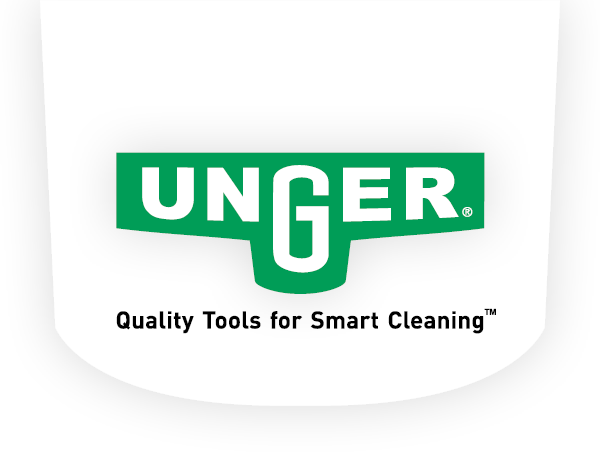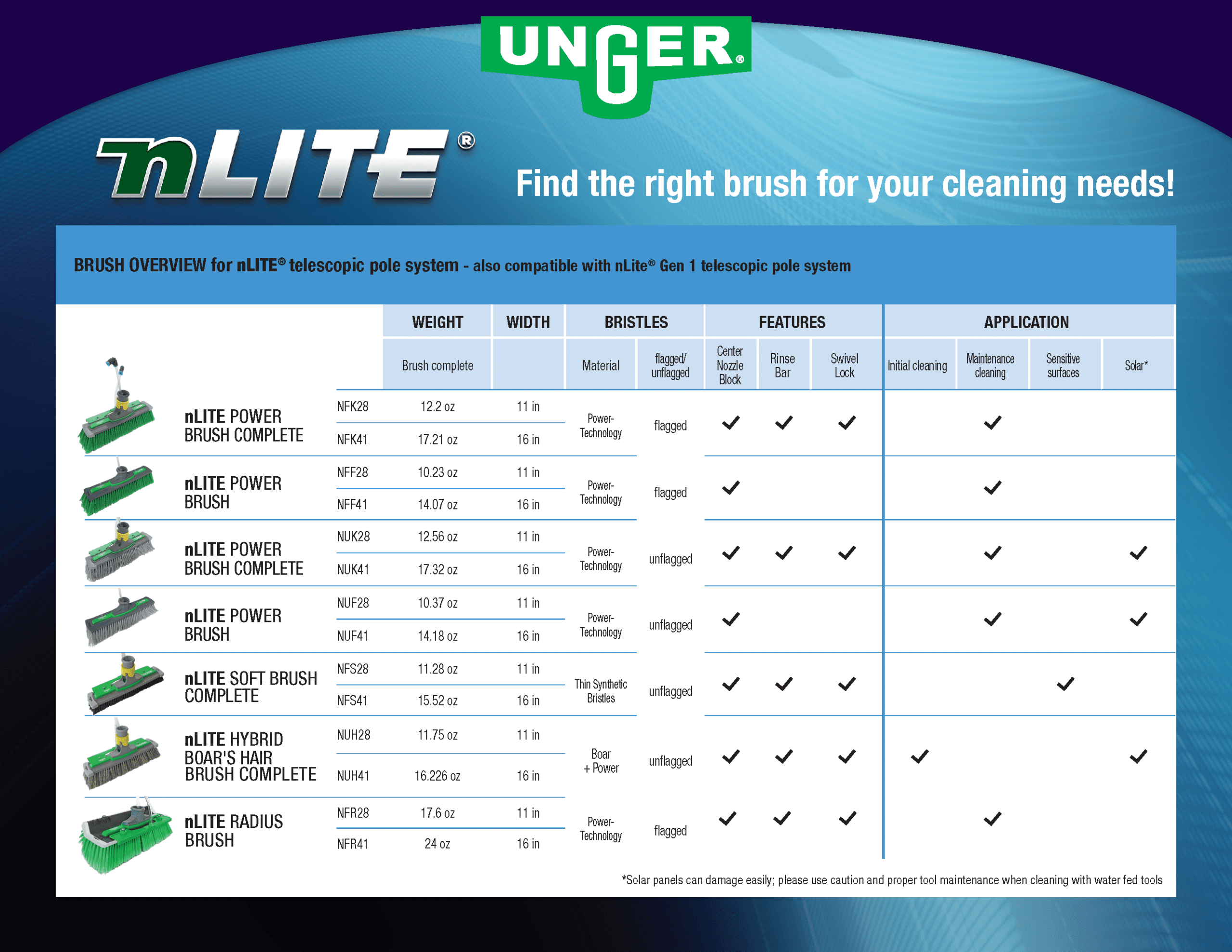NEW! Powerful Nano Filtration with Unger's HydroPower® Nano See The Product

Which Commercial Window Cleaning Brush is Best for Your Job?
When it comes to selecting the best window cleaning brush for your needs, you’ll need to take on the role of matchmaker to get the most out of your investment. Meaning, once you select the right water fed cleaning pole for the job, you’ll need to match it with the right brush(es). Finding that perfect match ensures that you’re not only getting the job done, but you’re executing it at the highest rate of speed and efficiency possible without jeopardizing the level of clean.
However, in the landscape of brushes, finding the perfect match means you potentially have to “kiss a few toads to find your prince.” To avoid unnecessary trial and error, the following guide will help you understand all the available options and their distinct traits so that you find your perfect match the first time around.
Considerations When Evaluating Brushes
To start, you’ll want to consider the cleaning application, surface quality and degree of cleaning needed to determine the appropriate window cleaning tools, techniques, and cleaning solutions required. Specifically, you’ll want to evaluate:
- Is the job at hand an initial cleaning, maintenance cleaning, or involve sensitive surfaces? If the surface is fragile or easily damaged, it’s important to take extra care when cleaning the window and using harsh chemicals or an abrasive brush could damage the surface, leading to costly repairs or replacement.
- Is the surface cracked or damaged? If so, it can make it more difficult to clean the window effectively and safely.
- Is the surface rough or uneven? If so, it can trap dirt, grime, and debris, making it more challenging to get the results you want.
Understanding Each Window Cleaning Brush Option
Once you identify the cleaning needs and any unique challenges of the job, you can then use those requirements in evaluating which window cleaning brush is best for the cleaning application. There are five main brush components you’ll want to consider:
- Bristles
Brush bristles can vary in material. Boar’s hair is a natural fiber, and these bristles are known for their ability to hold and distribute water and cleaning solutions effectively. On the other hand, nylon bristle brushes are derived from synthetic materials and are known for their flexibility and softness. For heavy-duty cleaning tasks that require deep scrubbing, a boar’s hair bristle brush may be more suitable. For regular maintenance that requires gentle cleaning, a nylon bristle brush may be a better option.
Flagged and unflagged, also known as soft or stiff bristles, refer to the way the bristles are cut. Flagged bristles have an angled cut and split ends, making them softer and more flexible. Flagged bristles are ideal for regular cleaning and normally soiled windows. Flagged bristles offer a better glide due to the larger contact surface area. Unflagged bristles have a straight cut without split ends. Less dirt sticks to unflagged bristles and they have a longer life span. This type of bristle is stiffer and more aggressive, making it better suited for heavy-duty cleaning.
The length of the bristles determines how well the brush can clean tight corners and angles. Short bristles are better suited for cleaning small, tight areas; longer bristles are ideal for cleaning larger surfaces.
- Brush Size
The size of the brush (weight and width) will determine how quickly you can clean a surface. A larger brush will cover a bigger area quicker, but it may be too bulky to use in tight spaces. A smaller brush may take longer to clean a surface but will be more maneuverable in tight spaces.
- Brush Shape
Radial and rectangular brushes are the two primary types. With a radial window cleaning brush, the bristles are arranged in a circular pattern. The radial shape allows the brush to conform to the curve of the surface you’re cleaning and apply pressure evenly across the entire area. Alternatively, a rectangular window cleaning brush typically has a long, flat shape with bristles arranged in rows. The rectangular shape allows the brush to cover a wide area and reach into corners easily. A rectangular brush also offers more options in terms of materials, number of jets, etc.
- Jets
A pencil jet and fan jet are two distinct types of nozzle heads that you can attach to a window cleaning brush to adjust the water pressure and flow. The main difference between a pencil jet and fan jet is the size and shape of the stream of water they produce.
A pencil jet produces a narrow, high pressure stream of water or cleaning solution that comes out of a small, circular opening in the nozzle head. This type of jet is ideal for removing stubborn dirt or stains in a specific area as it can blast away grime with precision and accuracy.
On the other hand, a fan jet is a wider, fan-shaped spray of water that comes out of multiple small openings on the nozzle head. This type of jet is better suited for cleaning and rinsing larger areas of glass or windows. The fan jet produces a lower-pressure, broader stream of water, making it easier to clean more quickly and efficiently.
- Extra Features to Consider
Center nozzle block: The center nozzle block houses the nozzle head and helps distribute water and cleaning solution. Rinse nozzles are ideal for hard to reach areas that require a strong water jet. . Some models may feature removable or adjustable nozzle heads, which you can use to rotate or angle the nozzle to change the direction of the water spray.
Rinse bar: A rinse bar distributes water evenly over the entire width of the brush which helps to loosen and remove dirt and grime. This makes the window cleaning process more efficient by reducing the need for additional scrubbing or wiping.
Swivel lock: A swivel lock allows the user to lock the brush head into a specific position, preventing it from rotating or swiveling during use. By locking the brush head in place, the user can focus on cleaning a specific area without the brush head moving or rotating unexpectedly, which can result in an uneven or incomplete cleaning.
Upgrade Your Professional Window Cleaning Solutions
For over 50 years, Unger has designed innovative professional window cleaning tools for professionals to clean and maintain facilities, faster, safer and more efficiently. When you’re ready to select your commercial window cleaning tools, we can help you find the perfect match for your needs, from brush selection to a complete window cleaning kit.
Contact Us to Discuss Your Window Cleaning Brush and Tool Needs

